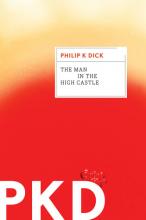inspiration + perspiration = invention :: T. Edison ::

Alternate history is still a relatively unknown genre, straddling so many lines that few know what to do with it. One of the earliest works of the modern era, and perhaps the most famous, is Philip Dick's exploration of a world where the Allies lost World War II. His vision of an occupied United States, for better or for worse, set the standard for many of the books that followed. As a thought experiment it excels. As a story, it enters and leaves the many narratives it spins without much care for the reader or a plot.
Dick as a writer almost has to be taken as a genre onto himself (especially when considering the number of adaptations made of his work). His stories rarely follow straight narrative lines, but Man in the High Castle is even more unpredictable due to his use of an ancient Asian form of divination to determine plot points, which itself would become a device used by the characters. It would be fairer to classify this novel as a series of intertwining stories rather than a solid whole.
In terms of setting, this book is right at home with any Cold War thriller, only offering different superpowers battling it out for supremacy. The spy narrative of Japanese versus German agents offers the best, most coherent narrative. I eagerly anticipated the next step, and it offers at least one specific ending if not a true conclusion.
The novel is heavily Western-centric in its historical point of view (such as how the Allies lost the war) and some of Dick's postulations read as completely ludicrous now (I can not begin to imagine the environmental impact of draining the Mediterranean Sea). But accepting the premise, Dick does shine a light on an occupied population's point of view by inverting the position his American characters inhabit, especially in how they see themselves in relationship to others twenty years after being defeated.
The most frustrating aspect of the book is its abrupt stop and the many stories that simply peter out of existence. The plight of a Jewish man and his business partner could have been interesting but only interrupted the novel at odd moments, lacking in emotional heft to keep me engaged. Another story about his estranged wife left me waiting for the other shoe to drop, which came not with a bang but a whimper. Sometimes the twists are great. Sometimes they're anticlimactic to the point of absurdity.
There are some intriguing and historically experimental ideas woven in The Man in the High Castle, which despite its odd structure and premise managed to carve out a place in the speculative fiction cannon. Its sprawling multinarrative pace reads like a foretaste of contemporary science fiction and fantasy television series. Dick himself admitted that the book deserved a sequel, considering the lack of a firm conclusion. Perhaps with Amazon's new adaptation we'll finally get the fulfillment of that vision.
One final note: there are certain scenes that contain moments of extreme, brutal violence, and some language that I'd put out of the league of many readers. Discretion is heavily advised.
This review is also posted on Goodreads and Amazon. I did not receive anything from the publisher or author for this review. The cover was designed by Melissa Lotfy. The book is currently available from Mariner Books as a Paperback ($8.09) and via Amazon as an eBook ($7.69).





